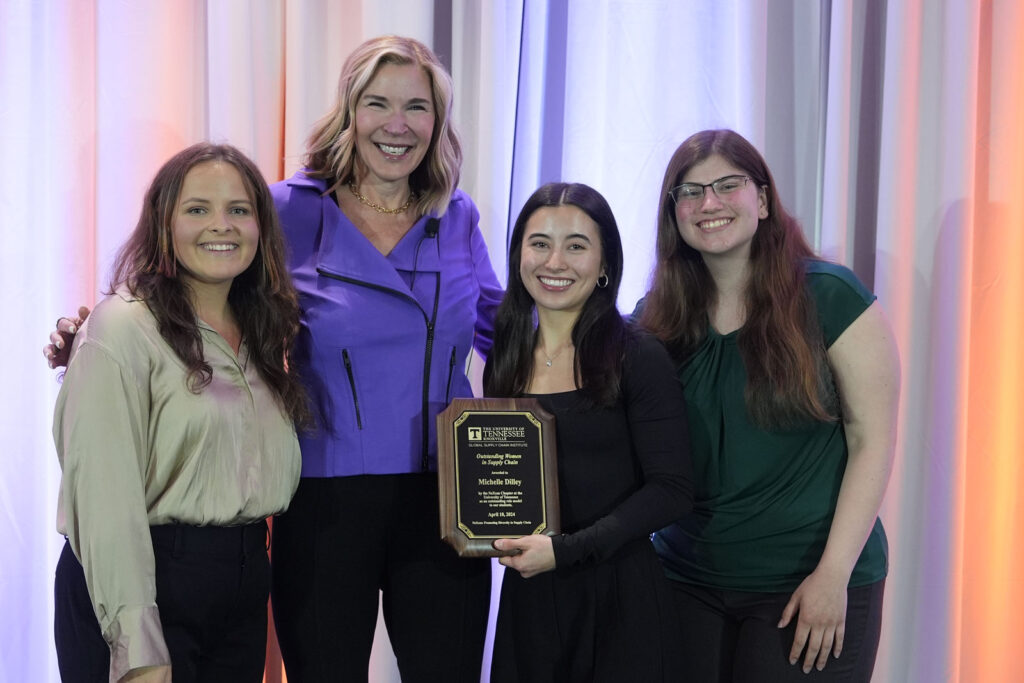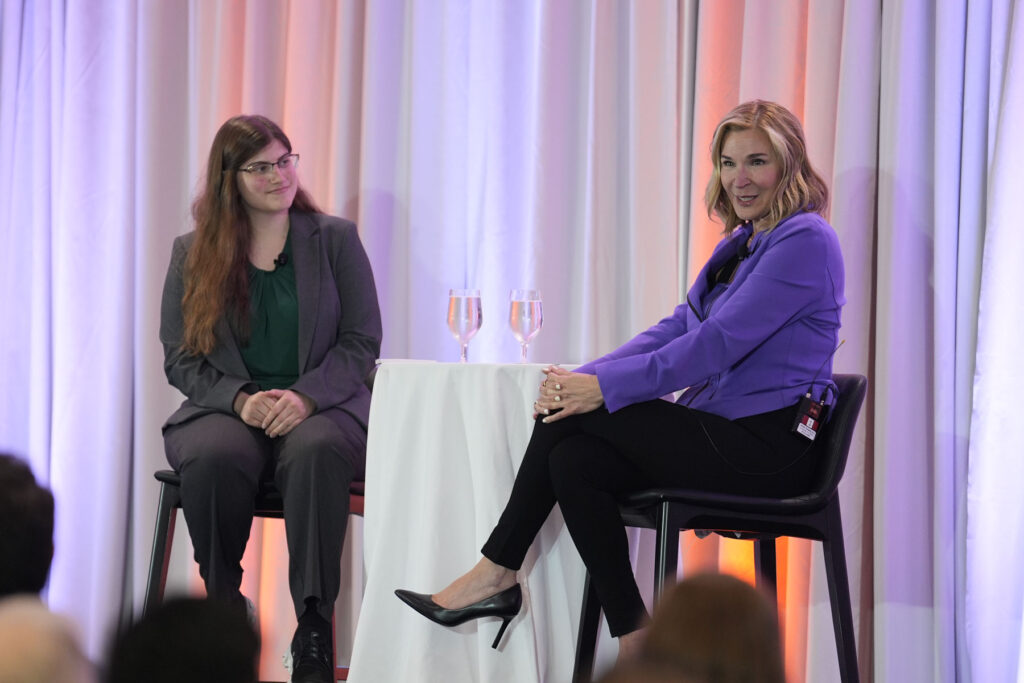Written by Katie Bahr
This is one of two posts based on sessions from the Spring 2024 Supply Chain Forum, which took place from April 9–11 in Knoxville, Tennessee. Read the first about UT supply chain management department head John Bell’s conversation with Randy Boyd. Attendees may watch every presentation from the forum under Resources in the GSCI app.
In a fireside chat, UT senior Nicole Carvagno spoke with Michelle Dilley, CEO of AWESOME (Achieving Women’s Excellence in Supply Chain Operations, Management, and Education) and recipient of the 2024 NeXxus Woman of the Year award, about the wisdom she’s gleaned during a 30-year career dedicated to developing supply chain professionals into the next generation of leaders.
Before joining AWESOME as its first CEO in 2020, Dilley held various leadership roles at Whirlpool, Ascension Health, DSC Logistics, and other organizations. However, her industry experience dates back long before she graduated from college to growing up as a girl on a fruit farm in Michigan.
“A big part of my contribution as a kid was sorting, distribution, and quality control—which consisted of searching apples for worms,” Dilley said to the room of more than 300 forum attendees.
Before answering Carvagno’s questions about her career, Dilley shared two challenges that she feels the incoming generation of business leaders will have to address: embracing diversity and prioritizing sustainability. Tackling them will require a willingness to learn and question, which Dilley developed as she switched from the home appliance industry to healthcare, third-party logistics, and private equity sectors.
“A lot of the struggles we face are sector agnostic,” Dilley said. “So, applying best practices from different industries and new thinking is really important. I always had something to learn. But I came at it with the mindset of ‘Why are we doing it that way?’”
She noted that active listening and strong communication skills will serve any young professional well, especially as they transition to new jobs or careers. You must understand the organization before you can implement changes.
“If you tap into people’s experiences, you can harness all of that background to come up with a solution together,” she said. “I’m not the smartest person in the room. I don’t have all the ideas. But what I can do is ask the right questions.”
Carvagno asked Dilley what influence previous managers have had on her career.
“The good leaders were good sponsors,” Dilley said. “They advocated for me when I wasn’t in the room. I try to get companies to focus on sponsorship in leadership, especially for young women.”
“Mark Brown [a senior leader at Whirlpool] asked me to take over an area when no one thought I was ready. But he put me in the role anyway. It opened up so much for me and gave me the confidence to know I have a lot to offer.”

There have also been poor leaders. Dilley shared a time when she applied for a promotion in a different functional area to broaden her experience. It was a move calculated to help develop her career, but her boss—who was new to his role—told her that he needed her to stay put.
“I just remember being crushed that he put his needs first,” she said.
When Dilley joined AWESOME, the organization was small, sponsoring a symposium, newsletter, and some regional events. She focuses on transformation, expanding scholarship opportunities (Carvagno is an AWESOME scholar), and partnering with corporations to create a network for women in early career supply chain roles.
She has pushed for a fairer representation of diversity within organizations and encouraged cultures of collaboration. Soliciting ideas from younger generations can go a long way toward fostering the growth of both female professionals and the business itself.
“There is a lot that young professionals don’t know,” Dilley said. “But they still have great ideas. Tap into that. If someone is not as outspoken, ask them to share their ideas. I absolutely believe in reverse mentoring. Young professionals come at it with fresher eyes and greater knowledge of technology; they just need the support of leadership.”
Mentorship alone is not enough. It must be paired with sponsorship, which can be informal or formal, to create relationships that would’ve never existed organically.
“It’s ultimately about stepping out and putting this individual’s name in the hat, equipping them to be successful, and helping them when they fail,” Dilley said.
Carvagno contrasted Dilley’s experience climbing the corporate ladder over the 16 years she spent at Whirlpool with the much shorter tenures of today’s young professionals. Dilley said that the younger generation likely knows what she discovered much later: multiple experiences make you well-rounded and further able to contribute to a company’s goals.
“Get that operations, on-the-floor experience as soon as possible,” she said. “Take that second shift operational manager role right away. There’s so much it can teach you, especially problem-solving in real-time, and it will really support you later.”
Sometimes, that may mean working with employees their parents’ age, which can be intimidating for professionals only a few years removed from college. But, in the end, good management is about offering support and removing barriers. Managers should take time to understand their people regardless of age and demographics.
What advice would Dilley give to young women professionals about how they can create more opportunities for themselves?
“Go after everything,” she said. “Don’t be afraid.”
“I figured out early that I was the only person responsible for my career. I depended on myself to make things happen. Take those stretch goals and see where you can make an impact. Speak up and raise your hand. You can’t sit back and wait. Prompt people and help them understand what you’re interested in.”
Dilley applied her advice broadly to the audience.
“We work in the most interesting and dynamic field today,” she said. “The world has finally realized how much they depend on this profession. I’d encourage more forums like this one, where academia leans in and helps industry think about the future, about automation, and how to have transparency across the supply chain to drive efficiencies. I’d also hope everyone realizes there’s so much power in diversity.”
Carvagno smiled and ended with an irresistible quip. “Thank you for having this awesome conversation with me,” she said.
